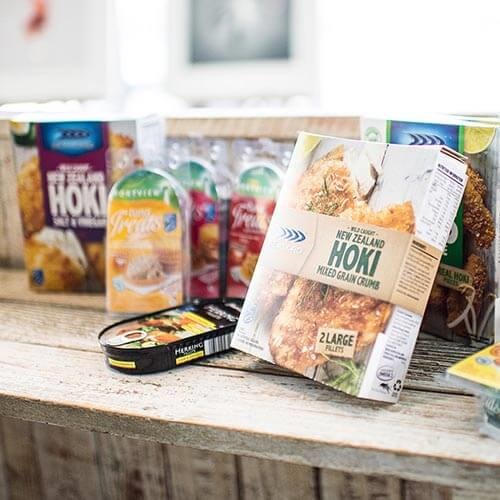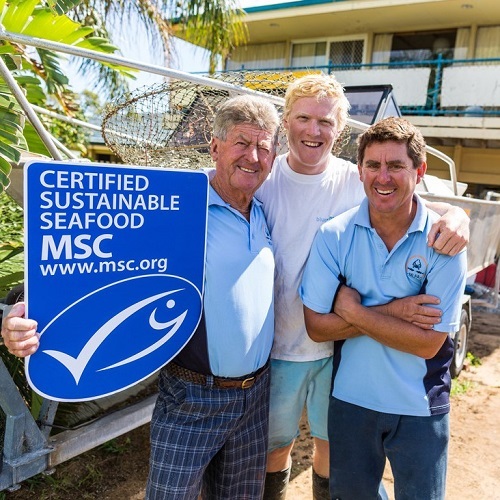A credible claim such as the MSC blue fish tick label independently verifies that your seafood comes from a sustainable source. Find out how to show your commitment to certified sustainable seafood.
What is a credible claim?
According to ISEAL, the global membership organisation for credible sustainability standards, credible claims are clear, accurate, and relevant, and are backed up by systems that are transparent and robust.
Meeting ACCC guidance
The ACCC has released eight principles to guide businesses’ environmental claims. This provides clear guidance for businesses to support credible claims.
"As a well-established and credible certification body aligned to these principles and those set out by the United Nations, we stand ready to work with businesses throughout the seafood supply chain to assist with mandatory ESG reporting, eliminate consumer confusion and tackle some of the pressing environmental challenges facing humanity." - Anne Gabriel, MSC Program Director, Oceania and Singapore
How are claims verified?
But not all claims are equal. How they are verified is important.
Seafood products can pass through long and complex supply chains between the ocean and reaching consumers. At each stage, there is a risk that products will be mislabelled or that products from an MSC-certified fishery will be mixed up with non-certified products.
Certification to the MSC Chain of Custody Standard ensures an unbroken chain where certified seafood is easily identifiable, is separate from non-certified products and can be traced back to another certified business.
This system allows businesses and consumers to be confident that seafood with the blue MSC label has come from a fishery certified as sustainable.
Claim verification ranked from least to most robust:
- Claim is not verified: this is where no benchmark or measurement is made, such as “We care about the ocean.” Or “Planet-friendly” OR “Ocean-friendly.”
- Self-assessed: mostly this includes claims and logos made by the brand or retailer, such as “All our seafood is responsibly sourced.”
- Interested party verified: this is where an interested party such as a trade body makes a blanket claim, such as “All Australian fisheries are sustainable.”
- Third-party verified: this is where a claim from an independent third party is used, such as “This product comes from a fishery that has been independently certified to the MSC’s standard for a well-managed and sustainable fishery. www.msc.org.”
The benefits of using a credible claim
- Seafood with the blue MSC fish tick comes from an MSC certified sustainable fishery. Seafood with the MSC label is certified all along the supply chain.
- The blue MSC fish tick represents the world’s most recognised and market-leading seafood certification scheme as endorsed by GSSI and the UN FAO.
- Research shows consumers most trust scientists and NGOs to tackle ocean health and independent certification increases consumer trust in brands.
The MSC claim
The MSC claim accompanies the MSC blue fish tick label and Chain of Custody code on menus and packaging and is available in four versions.
- This seafood meets the MSC's standard for environmental sustainability. This means it comes from a well-managed fishery that minimises its impact on the ocean and protects fish stocks for the future. msc.org
- This seafood comes from a fishery that’s been independently certified to the MSC’s environmental standard for fishing. msc.org
- The [insert seafood species] in this product comes from a fishery that has been independently certified to the MSC’s environmental standard for fishing. msc.org
- Seafood certified to MSC’s environmental standard for fishing. msc.org
Assessing claims against the ACCC guidance
MSC labelled canned tuna outperforms in Australia eco tests
A new University of Tasmania (UTAS) report, Navigating sustainability: canned tuna in Australia, commissioned by the Marine Stewardship Council (MSC) scores canned tuna brands against ACCC Principles for Environmental Claims.
The first-of-its-kind academic study from the University of Tasmania has revealed which Australian brands can back up their environmental claims – and which may fall short on evidence. The study scored 14 commonly purchased canned tuna brands against the Australian Competition and Consumer Commission's (ACCC) principles for making environmental claims, providing an evidence-based benchmark that cuts through greenwash and guesswork.
A handful of brands emerged as leaders for their credible, transparent information communicating their sustainability practices and adherence to ACCC guidelines. The six lowest scoring brands had notable scope to improve on their sustainability communication and transparency. Overall, the report underscored the need for clearer sustainability messaging and improved accountability among brand packaging to ensure consumers can make informed choices.
“Our analysis shows that independent certification isn’t just helpful - it’s essential.” said Associate Professor Dan Daugaard, lead researcher at the University of Tasmania. “Brands with verified claims are more aligned with regulatory standards and far more likely to win consumer trust.”
| Date effective: | 02 May 2025 |
|---|
What Australia seafood consumers think
According to our 2024 survey, conducted by independent research and strategy consultancy, GlobeScan, with seafood consumers in Australia:45%
81%
78%
50%
Other credible claims
For schemes operating in Australia and New Zealand, check to see if the organisation making the claim is part of the Trusted Labels Group, which subscribe to ISEAL’s Credibility Principles, and includes the Aquaculture Stewardship Council, Australian Australian Organic, Fairtrade, FSC, GECA and the Marine Stewardship Council.
For global schemes, check to see if the organisation making the claim is an ISEAL member.
Find out more

MSC label guidelines
Our guidelines set out the basic rules on how to use the blue MSC fish tick on product packaging, restaurant menus, fish counters and promotional material.

Apply to use the blue MSC fish tick
The blue MSC fish tick makes it easy for your customers to select sustainable, wild seafood that they can trust. Find out the costs and apply.

Promote sustainable seafood
Promote your commitment to sourcing certified sustainable seafood and increase sales of your MSC labelled products. Use our marketing assets and toolkits.

